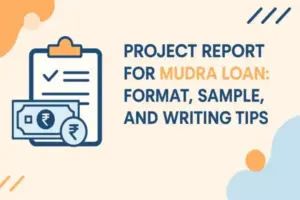Can a salaried person apply for a Mudra Loan for Salaried Person? Yes, they can. This guide explains how you can get a Mudra Loan as a salaried person, the eligibility criteria, required documents, and business ideas suitable for you.
Key Takeaways
- Salaried individuals are eligible for Mudra Loans under the Pradhan Mantri Mudra Yojana, enabling them to start part-time businesses alongside their full-time employment.
- Mudra Loans are categorized into three segments—Shishu, Kishor, and Tarun—tailoring financial assistance to the specific needs of micro and small enterprises.
- Key requirements for applying include a clear business plan, proof of ongoing non-salaried business activity, and necessary documentation such as identity verification and financial statements.
Introduction
The Mudra Loan scheme, also known as the Pradhan Mantri Mudra Yojana (PMMY), was launched to support micro and small business enterprises across various sectors in India. One common misconception is that salaried individuals are ineligible for these loans, but that is far from the truth. The mudra scheme is designed to be inclusive, providing financial assistance to those with viable business ideas, regardless of their current employment status, as emphasized by the hon’ble prime minister.
This scheme is particularly beneficial for those working professionals who aspire to start their own business in the future. Knowing the eligibility criteria, required documentation, and suitable part-time businesses allows salaried individuals to confidently move towards financial independence and growth benefits.
Understanding Mudra Loans
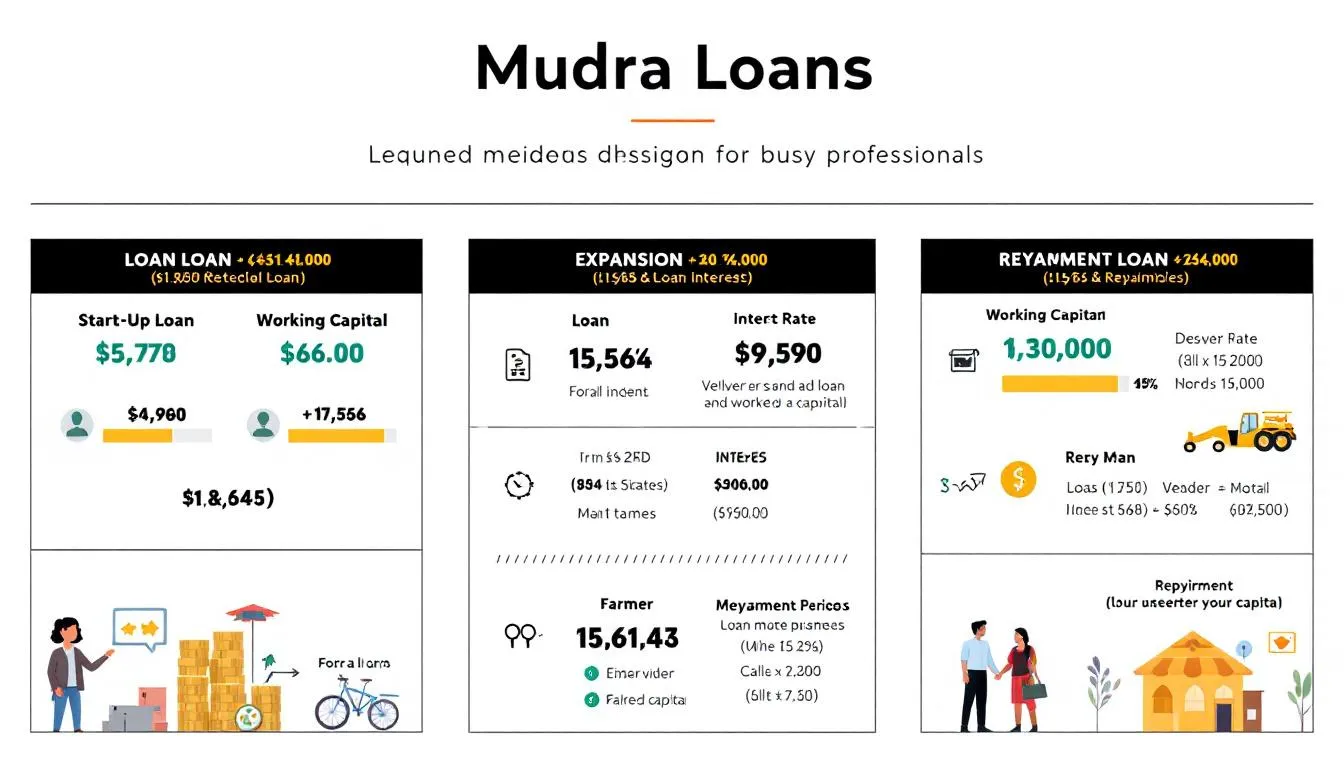
The Pradhan Mantri Mudra Yojana (PMMY) aims to support new or upgrading beneficiary micro unit business enterprises in various sectors. Whether you are an individual, a proprietorship, a partnership firm, or a small manufacturing unit, you are eligible to apply for Mudra Loans. This scheme provides crucial financial assistance to micro units and small business enterprises, facilitating their growth and development.
Mudra Loans are categorized into three main segments: Shishu, Kishor, and Tarun, based on the loan amount required. This categorization helps in tailoring the financial assistance to the specific needs of the business, ensuring that the right amount of support is provided at each stage of business growth.
Categories of Mudra Loans
Mudra Loans are divided into three segments:
- Shishu: Loans up to ₹50,000, suitable for startups and smaller business needs.
- Kishor: Loans ranging from ₹50,001 to ₹5 lakh, designed for businesses that need additional funding to grow.
- Tarun: (Note: The description for Tarun loans is not provided in the text.)
Tarun loans, which range from ₹5 lakh to ₹10 lakh, are aimed at scaling up established businesses. Salaried individuals can apply for loans under any of these categories, depending on the amount needed.
Eligibility Criteria for Mudra Loans
Various types of entities can apply for Mudra Loans, including:
- Individuals
- Women
- Proprietary concerns
- Partnership firms
- Private limited companies
- Other entities
Salaried individuals are also eligible, provided they meet specific income criteria and have a clear business plan. This inclusivity ensures that a wide range of potential entrepreneurs can benefit from the scheme, promoting economic growth and development across the country.
Applicants must show evidence of an ongoing non-salaried business, such as part-time work or freelance activities generating income outside of regular employment. Meeting these applicable criteria is essential for loan approval.
Can Salaried Individuals Apply for Mudra Loans?
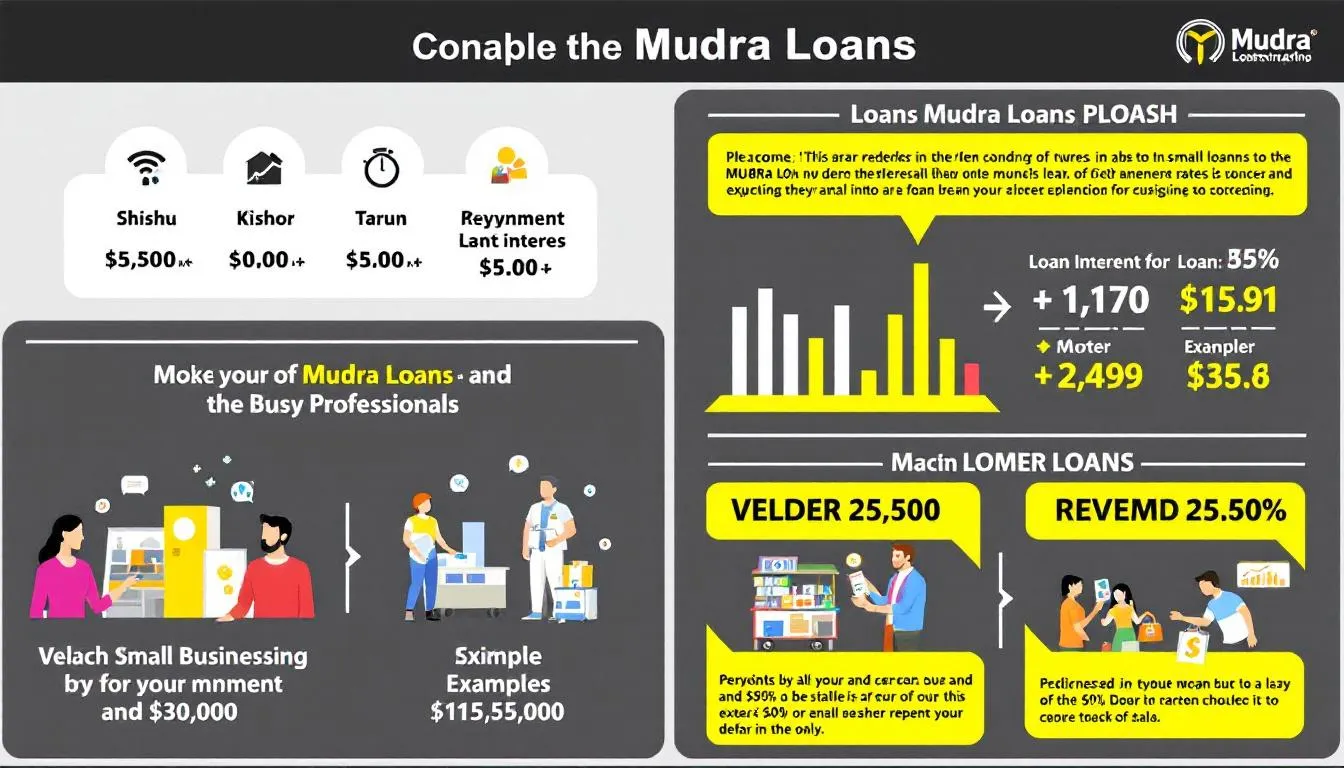
Yes, salaried individuals can apply for Mudra Loans, provided they meet certain eligibility requirements. The Mudra Loan scheme aims to provide financial assistance to small and micro enterprises to aid in their growth and expansion. This makes it an ideal option for those who are looking to supplement their income with a side business while maintaining their full-time employment.
Part-time businesses offer flexibility and a source of additional income, making them an attractive option for salaried individuals. A clear income generation plan enables salaried individuals to use Mudra Loans to start their entrepreneurial journey.
Non-Salaried Business Activity Requirement
To qualify for a Mudra Loan, the business activity should be non-salaried, such as freelance work or weekend ventures. The business must generate income independently of the individual’s regular employment. Eligible non-salaried business activities include freelance roles or home-based units, allowing for flexible work hours and additional income generation, including non farm enterprises.
Clear Business Plan Necessity
Many Mudra loan applications are rejected due to confusion about eligibility requirements and documentation. A clear and well-defined business plan demonstrates the viability of the business idea and ensures the applicant meets loan requirements, reducing the risk of rejection.
Types of Part-Time Businesses Suitable for Salaried Individuals

Salaried individuals can explore various part-time businesses to supplement their income. Some suitable options include tiffin services, home bakeries, and tuition centers. These businesses require minimal investment and offer the flexibility to manage alongside full-time employment.
Starting a part-time business not only provides additional income but also helps in building entrepreneurial skills. Whether it’s catering to the rising demand for home-cooked meals through a tiffin service or offering educational support through a tuition center, there are numerous opportunities to explore and grow.
Tiffin Services
Starting a tiffin service can be a low-investment venture ideal for salaried individuals, allowing flexible work hours and income generation. With the rising demand for home-cooked meals among working professionals, a tiffin service can be a lucrative business, especially in urban areas where convenience is highly valued.
Home Bakeries
Home bakeries have a growing demand in urban areas and rural and urban areas, offering various baked goods to cater to local tastes. To start a home bakery, one must comply with health and safety regulations and obtain necessary licenses.
A detailed business plan outlining goals, strategies, and financial projections is essential for the bakery’s success.
Tuition Centers
Tuition centers provide an opportunity for entrepreneurial individuals to generate additional income while contributing to the education sector. Mr. Firozkhan’s success stories are a testament to this potential. He started his classes with only 10-12 students and expanded over time by adding courses such as Tally, DTP, and Web Designing, now catering to around 140-145 students.
Required Documentation for Salaried Applicants
To apply for a Mudra Loan, salaried individuals need to submit specific documents, including:
- A business plan
- Identity and address proof
- Proof of business activity
- Bank statements
- Optional salary slips
Proper documentation ensures a smoother loan application process and increases the chances of approval in regard to the informed guidelines.
Common documents for identity verification include Aadhaar card, PAN card, and Voter ID, while utility bills can serve as address proof. Additionally, demonstrating the nature and continuity of the business through invoices or contracts is crucial for verifying business activity.
Business Plan
A well-defined business plan is essential for salaried individuals seeking Mudra Loans. It outlines business goals, strategies, and financial projections, demonstrating the proposed business’s viability.
A comprehensive project report can effectively showcase the business’s income potential and appeal to lenders.
Identity and Address Proof
Salaried applicants must provide proof of identity and address for the loan application. Commonly accepted documents for this purpose include Aadhaar card, passport, or voter ID for identity verification, and utility bills for address proof.
Proof of Business Activity
Documents demonstrating the nature and continuity of the business are necessary to verify business activity. Applicants may need to provide invoices or contracts related to their business to demonstrate ongoing activity and legitimacy.
Bank Statements and Salary Slips
Bank statements demonstrate financial transaction and stability, helping lenders assess income consistency and spending patterns, thus contributing to the overall Credit needs and creditworthiness evaluation.
Salary slips can be provided as supplementary information but are not mandatory for the application.
Overcoming Common Challenges
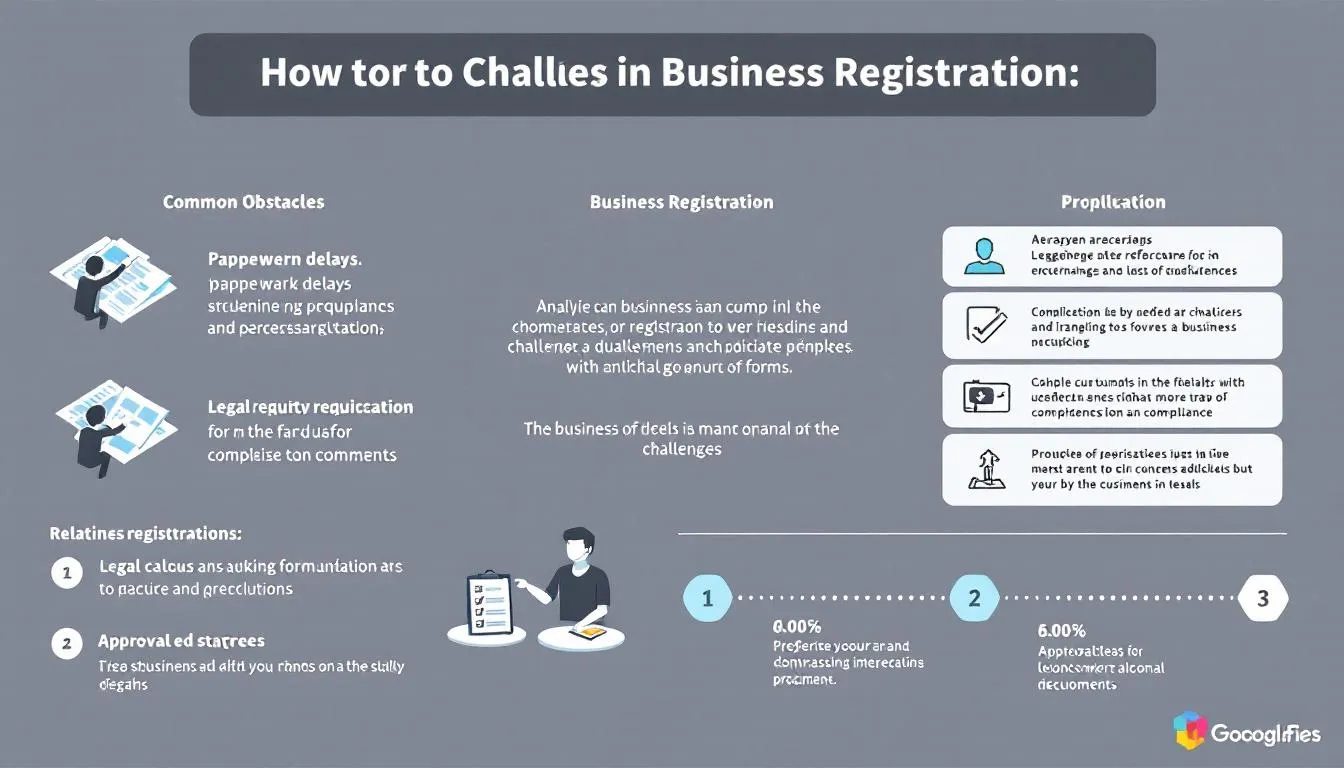
Salaried applicants often face hurdles in proving their business viability due to limited entrepreneurial experience. Common challenges include lack of business registration and bank discretion favoring full-time entrepreneurs. However, these challenges can be overcome with proper planning and documentation.
A solid business idea and well-prepared operational plan are essential to compensate for the lack of formal business registration. Engaging with banks where you already have accounts may also increase your chances of approval, as existing relationships can foster trust.
Lack of Business Registration
Lacking formal business registration can make it challenging for salaried individuals to secure funding, but it does not completely eliminate their chances. Showcasing a strong business idea and operational plan allows salaried individuals to obtain a Mudra loan despite lacking formal business registration.
Bank Discretion Favoring Full-Time Entrepreneurs
To gain bank approval for part-time business plans, applicants should provide comprehensive documentation, including:
- Expected revenue
- Market analysis
- A solid business plan
- Projected cash flow
These elements help demonstrate the business’s viability.
Increasing Chances of Approval
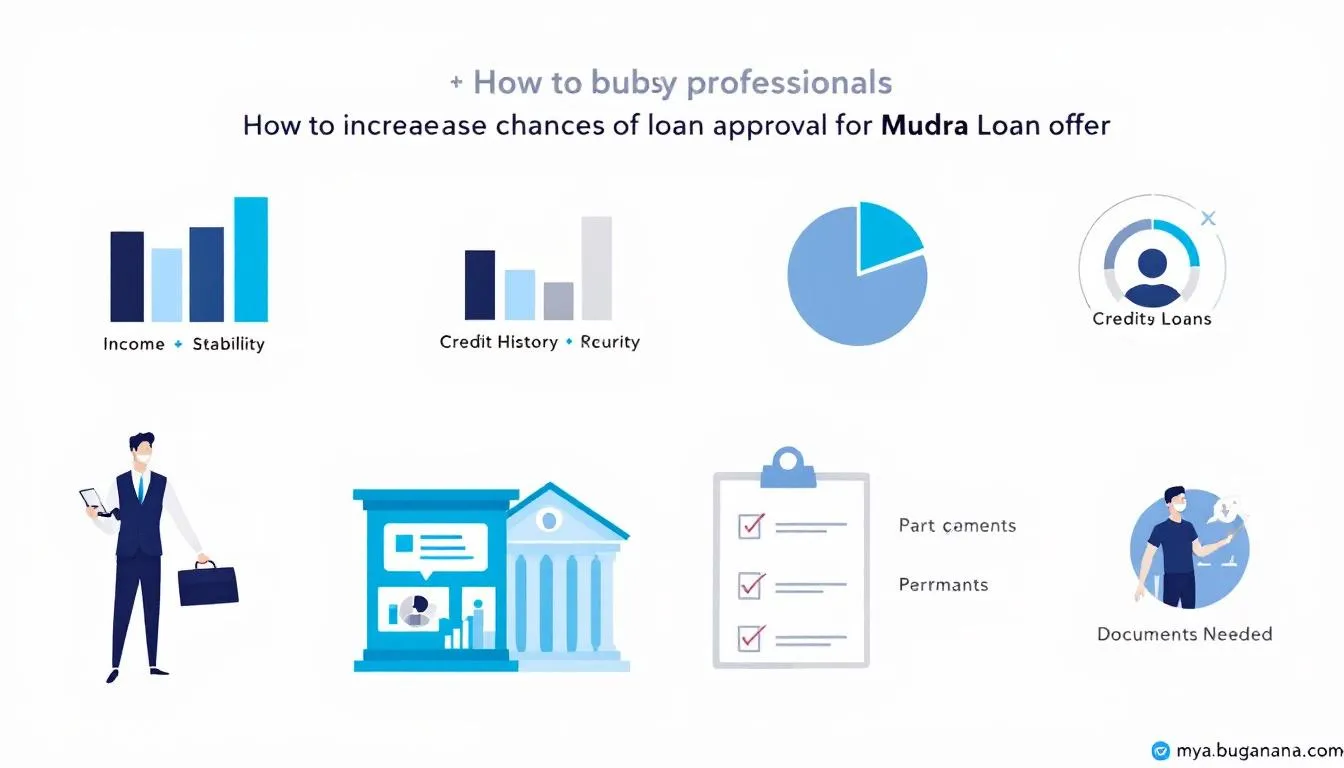
Applying for a Mudra loan without business registration is possible, but securing registration through the Udyam portal significantly enhances approval chances. A well-structured business plan also improves the likelihood of approval.
To support a loan application, you can provide:
- Recent bank statements to help validate the financial stability of the applicant
- Salary slips, which may be optionally included
- A project report showing business income potential to further enhance the credibility of the loan application
Udyam Registration
Udyam Registration legitimizes a business, making it eligible for various government schemes like Mudra Loans. The process is straightforward and free, encouraging small enterprises to formalize their operations and form a solid foundation.
Providing Aadhaar number, PAN, and other relevant business details is required for obtaining Udyam Registration.
Project Report
A project report demonstrates the business’s feasibility to potential lenders, clearly articulating business goals, finance projections, and operational strategies.
Lenders typically assess the projected income and cash flow statements to evaluate the income potential of the business.
Summary
In conclusion, the Mudra Loan scheme offers a tremendous opportunity for salaried individuals to embark on entrepreneurial ventures without having to leave their jobs. By understanding the eligibility criteria, required documentation, and the types of part-time businesses that can be pursued, salaried individuals can leverage this government scheme to secure their financial future. Proper planning, clear business ideas, and comprehensive documentation are key to overcoming common challenges and increasing the chances of loan approval. With the right approach, Mudra Loans can be the stepping stone to achieving your entrepreneurial dreams and financial independence.
Frequently Asked Questions
Can I get Mudra Loan if I don’t leave my job?
Yes, you can obtain a Mudra Loan while still employed, as long as you possess a solid business plan and meet the necessary eligibility criteria.
Can I show salary income as part of loan security?
You can show salary income as part of loan security, as it demonstrates financial stability, but lenders primarily focus on the business’s income potential.
What happens if I repay the loan while being salaried?
Repaying a loan while being salaried is commendable and reflects financial responsibility. It can positively impact your credit score and potentially improve your financial standing.
Is a company NOC required?
While a No Objection Certificate (NOC) is not mandatory, obtaining one can significantly enhance your application.
Can I get a loan without a business name?
You can obtain a loan without a registered business name; however, having one typically enhances your likelihood of approval.
- Rejected Mudra Loan – What to Do Next? Appeal Process Explained
- Mudra Loan for Used Vehicle: Benefits, Interest Rates, and Eligibility Criteria
- Is the Mudra Loan Subsidy Real or Fake? Get the Facts Here
- Get Your Mudra Loan Approved: Write a Perfect Project Report with This Guide
- Mudra Loan Without CIBIL Score: How to Qualify and Apply
- Mudra Loan Without PAN Card: Eligibility & Application Process Explained
- Secure Your Future: Mudra Loan for Salaried Person Explained
- Mudra Loan for Senior Citizens or Retired Persons – Eligibility, Benefits & Myths
- Mudra Loan for Disabled Persons: Eligibility, Interest Rates, and Benefits
- Best Tips for Securing a Mudra Loan for SC ST Applicants
- Top Benefits of Mudra Loan for Women Entrepreneurs
- How to Get Mudra Loan for Franchise Business in India
- Mudra Loan for Home Business: How to Apply and Benefits
- Can I Get Mudra Loan Without GST or Udyam Registration?
- Mudra Loan for Amazon Seller, Dropshipping, and Affiliate Marketing – Is It Possible?
- Best Mudra Loan for Housewives – Empowering Women Across India
- Top Reasons for Mudra Loan Rejected and How to Fix Them
- Best Business Idea Under Mudra Loan 5 Lakh for 2025
- Mudra Loan for Used Machine: Eligibility, Interest Rates & Benefits




